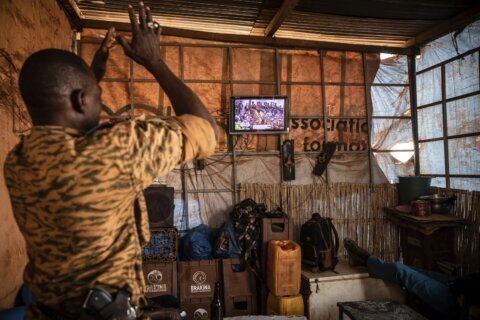SAN SALVADOR, El Salvador (AP) — Eulalia García was stunned when she opened an invitation from the president of El Salvador, Nayib Bukele. A bus would take her family the following day to receive a surprise Christmas gift, it said.
Garcia had survived a mudslide that killed four in her family and destroyed their humble homes on the slopes of the San Salvador volcano.
Her neighbor in Los Angelitos, Inés Flamenco, was so grateful for her invitation that she spent three days’ earnings on a gift for the president–a bouquet of roses that would turn into a beautiful photo opportunity for Bukele.
“I wanted to tell him how happy I was,” she recalled.
But the Christmas joy would be short-lived. Their gifts came with a steep price tag.
___
This story is part of a series, After the Deluge, produced with support from the Pulitzer Center on Crisis Reporting.
___
The 2020 Atlantic hurricane season wiped out homes and crops and displaced more than half a million people in Central America, particularly in Guatemala and Honduras.
In El Salvador, a populist president saw opportunity where tragedy struck. Bukele moved quickly to demonstrate that he could deliver to hundreds of families from Los Angelitos — a program that surely would be appreciated by his countrymen.
There was a problem, though. Bukele forgot to ask the people what they needed to recover from the tropical storm.
Disaster struck on the night of Oct. 29, a dam of fallen trees and rocky soil high on the volcano broke under pounding rain, causing the landslide that devoured Los Angelitos.
Garcia’s husband, Ramón Sánchez, woke up around 10:40 that night. “A rock had hit a tree behind my house, the walls shook, and water started coming in everywhere.”
Sanchez and García grabbed their two children and pushed through the water to high ground, but Sanchez´s mother, brother and two nephews who were sleeping in an adobe house next to theirs were buried alive. They were among eleven people who died as 78 houses were demolished.
“It was over as quickly as it began,” Sánchez said.
Nearby, Inés Flamenco, 73, awoke and started running only to encounter the mangled body of a neighbor dragged to death by mud and stones. She breaks into tears as she remembers him.
After the deluge, everything seemed to happen fast, like in a movie.
Within an hour of the mudslide, Defense Minister Rene Merino appeared on the scene and tagged President Bukele in Twitter to let him know that he had taken command of the rescue operation.
At dawn, Interior Minister Mario Durán joined the effort. When he spoke to the media, he had smudges of dirt on his face — proof that the populist government was in the thick of it.
Shelters were set up in schools. Within 48 hours, Housing Minister Michelle Sol arrived with a promise. The government would give homeless families houses. And money to rent houses.
In less than two months they got the invitation to meet with the president.
The trip to receive their surprise gift was 15 minutes and a world away. They crossed a security barrier into Ciudad Marsella, a private residential development with a succession of gleaming new houses on a street so perfect that it didn’t seem real.
“A guide came up to us, checked our names and took us straight to the door of a house, gave us the keys, said it was ours and told us to wait because the president was on his way,” Garcia said.
Each family was given a check for $25,300 to buy their house. With the houses came a list of conditions that they signed without reading. Suddenly, these homeless families — small-scale farmers — were part of a middle-class community.
In record time, 50 days after the storm, survivors from Los Angelitos received furnished houses with access to play spaces for children, a swimming pool, food bags, $250 a-month checks until August and a temporary exemption from paying the expenses for security and common premises.
President Bukele arrived with cameras for a speech, hugs and pictures.
He had earmarked $5 million that he said was “saved” from the construction of a hospital to spend on a residential community with available houses. There was no public bidding, just his decision.
He knew the decision he had taken was considered unconstitutional by many, but Bukele said, “rain cannot be unconstitutional.”
Public opinion is with Bukele for now. After trying to stop the president’s plans, the opposition mayor of Nejapa, lost local elections in a political landslide to the candidate of Nuevas Ideas –Bukele´s party.
But among the mudslide victims, opinions are divided.
After hugging and giving the bouquet of roses to Bukele, Inés Flamenco remembered that she had to go back to Los Angelitos to tend her animals. She realized that the bus ride would cost $3 round trip. Soon she’d have to pay utilities and fees.
“I panicked. I barely make $5 a day.”
She gave the house back.
“They took me to a place without asking and then accused me of being ungrateful for a gift that I didn’t ask for.”
Garcia and Sanchez are keeping their new house for now, but as of July at least 28 families had decided to return them. Like Flamenco, most went back to Los Angelitos.
Cecilia Flores’ ailing mother got a house in Ciudad Marsella, but it sits empty. She could not live alone in the new house because of her health. If Flores was to move in with her mother, she’d have to leave her children behind and quit her job selling lunches to workers at a nearby factory. They’re back in Los Angelitos, but weren’t allowed to rent out their new house.
“Instead of sitting down to listen and think about the options, Bukele looked for a quick photo op and created a bigger problem for people who already had a lot of problems.”
Copyright © 2024 The Associated Press. All rights reserved. This material may not be published, broadcast, written or redistributed.







